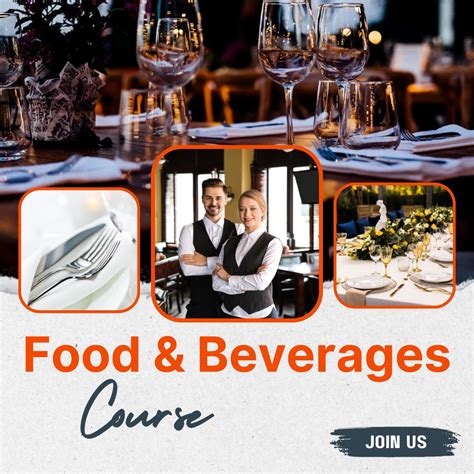A Comprehensive Guide to Food and Beverage Courses: Culinary Delights and Career Opportunities
Are you passionate about food and beverages? Do you dream of crafting delectable dishes or expertly pairing wines? A food and beverage course could be your ticket to turning that passion into a rewarding career. This comprehensive guide explores the diverse world of food and beverage courses, outlining what to expect, the career paths they unlock, and how to choose the right program for you.
What to Expect in a Food and Beverage Course
Food and beverage courses encompass a wide range of specializations, catering to various interests and skill levels. Depending on the course's focus and length, you can expect to gain practical skills and theoretical knowledge in areas like:
-
Culinary Arts: Mastering fundamental cooking techniques, knife skills, recipe development, menu planning, and food presentation. Courses might delve into specific cuisines (e.g., French, Italian, Asian) or culinary styles.
-
Baking and Pastry: Learning the art of baking bread, cakes, pastries, and desserts. This often involves precise measurements, specialized equipment, and understanding different baking techniques.
-
Beverage Management: Gaining expertise in wine, spirits, beer, and non-alcoholic beverages. This includes knowledge of production, tasting techniques, responsible alcohol service, and beverage pairings.
-
Restaurant Management: Developing the business acumen needed to run a successful restaurant or food service establishment. This encompasses everything from managing staff and finances to marketing and customer service.
-
Food Safety and Hygiene: Understanding critical food safety regulations and practices to maintain a safe and sanitary food preparation environment.
Career Opportunities After Completing a Food and Beverage Course
A food and beverage course opens doors to a variety of exciting career paths. The specific opportunities depend on your chosen specialization and the course's level of intensity. Possible career paths include:
-
Chef: From line cook to head chef, leading a kitchen team and creating innovative menus.
-
Pastry Chef: Specializing in the art of desserts and baked goods, creating stunning pastries and cakes.
-
Sommelier: An expert in wine and beverage pairings, enhancing the dining experience for guests.
-
Restaurant Manager: Overseeing the daily operations of a restaurant, ensuring smooth service and profitability.
-
Food Stylist: Working in the media industry, making food look appealing for photography and filming.
-
Food Critic: Sharing your culinary expertise and insights through writing or broadcasting.
-
Catering Manager: Planning and executing catering events, from small gatherings to large-scale functions.
-
Barista: Mastering the art of coffee preparation and creating exquisite coffee-based drinks.
Choosing the Right Food and Beverage Course
Selecting the right food and beverage course is crucial. Consider these factors:
-
Course Structure: Look for a curriculum that aligns with your interests and career goals.
-
Accreditation: Choose an accredited institution to ensure the quality and credibility of the program.
-
Practical Experience: Programs offering hands-on training and internships provide invaluable real-world experience.
-
Faculty Expertise: Learn from experienced professionals with extensive knowledge and industry connections.
-
Course Duration and Cost: Determine the length of the program and whether it fits your budget and schedule.
Investing in a food and beverage course can be a rewarding choice for anyone passionate about food and drinks. With dedication and the right training, you can build a fulfilling career in this vibrant and ever-evolving industry. Remember to thoroughly research different programs to find the perfect fit for your ambitions.
